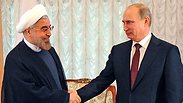
Russia sees chance of deal at nuclear talks with Iran
With talks nearing Nov 24 deadline, Russia says 'it's not just possible to make the deadline, it's necessary;' meanwhile, Iran admits new centrifuge testing, but no violation of atom deal with powers
A deal is vital at talks between world powers and Tehran on Iran's nuclear program and Russia is not considering the possibility of the negotiations failing, a senior Russian envoy said on Wednesday.
A Nov. 24 deadline has been set for Iran and the six powers to clinch a deal that would provide assurances to the West that Tehran's nuclear program will not be used to build nuclear weapons, in exchange for an easing of sanctions on Iran.
Russian Deputy Foreign Minister Sergei Ryabkov, who took part in the latest talks in Muscat on Sunday and Monday, said Moscow was doing all it could to help the sides reach a deal.
"We aren't looking at the possibility of not reaching a deal by Nov. 24. We are focused completely on the task before us in so far as we have a chance and it's not small. We can't miss (the opportunity)," he was quoted as saying by Interfax news agency.
Russia has warmer relations with Iran than other powers involved in the talks which also involve the United States, Germany, China, France and Britain.
Ali Akbar Salehi, the head of Iran's Atomic Energy Organization (AEOI), was in Moscow on Tuesday for talks on nuclear power cooperation.
"Before Nov. 24, it's not just possible to make the deadline, it's necessary. I would like to underscore that we're doing very much for that," Ryabkov said.
New testing
Iran has confirmed it tested a new centrifuge that could speed up its enrichment of uranium but dismissed suggestions the move may have violated last year's nuclear deal with world powers, as suggested by a U.S. think-tank.
Foreign Ministry spokeswoman Marzieh Afkham gave no indication that Iran had stopped feeding natural uranium gas into the so-called IR-5 centrifuge. Washington said on Monday Tehran had ceased the activity.
Iran's development of advanced enrichment centrifuges is sensitive because, if successful, it could enable the country to produce potential nuclear bomb material at a rate several times that of the decades-old model now in use. Iran says it is only producing enriched uranium to fuel nuclear power plants.
Afkham said the IR-5 was among ordinary machines belonging to Iran's Atomic Energy Organization, the official state news agency IRNA reported.
"Such tests were conducted before the Geneva agreement (between Iran and the world powers) and have continued after the deal was reached," she said late on Tuesday. "Testing on the machines will be carried out and stopped depending on the need."
The IR-5 is one of several new models that Iran has been seeking to develop to replace the erratic, 1970s vintage IR-1 centrifuge that it now uses to produce refined uranium.
Last year's interim nuclear agreement between Iran and the six global powers said Tehran could continue its "current enrichment R&D (research and development) practices", language that implies it should not expand them.
After a UN nuclear agency report on Friday said Iran had "intermittently" been feeding the IR-5 with uranium gas, the U.S.-based Institute for Science and International Security (ISIS) said this may have been a violation of the accord.
Afkham dismissed the allegation as "psychological warfare".
Other US experts said they no saw no breach of the agreement between Iran and the United States, France, Germany, China, Russia and Britain - designed to buy time for talks on a permanent settlement by a Nov. 24 deadline.










